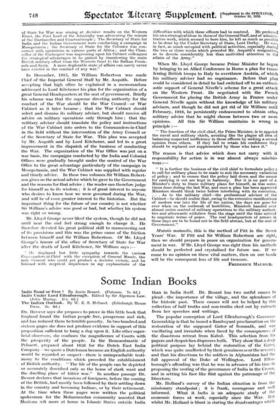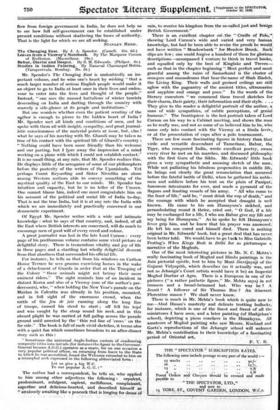Some Indian Books
DR. BF:sANT says she proposes to prove in this little book that England found the Indian people free, prosperous and rich, and has reduced them to terrible poverty. In two hundred and sixteen pages she does not produce evidence in support of this proposition sufficient to hang a dog upon it. Like other super- ficial observers, she confuses the magnificence of Courts with the prosperity of the people. In the Remonstrantie - of Pclsaert, prepared about 1626 for the Dutch East India Company--we quote a Dutchman because an English authority would be regarded as suspect—there is unimpeachable testi- mony to the conditions which preceded the establishment of British authority. " The life of the people can be depicted or accurately described only as the home of stark want and the dwelling place of bitter woe." In another passage Dr. Besant declares that invasions of foreigners, before the coming of the British, had mostly been followed by their settling down in the country and becoming Indians, or by their retirement. At the time when these pages were written the political spokesman for the Mohammedan community asserted that Moslems telt more at home in Islamic States outside India
than in India itself. Dr. Besant has two useful causes to plead—the importance of the village, and the splendours of the historic past. These causes will not be helped by this collection of half truths and non-truths eked out by extracts from her speeches and writings.
The popular conception of Lord Ellenborough's Governor- Generalship is that he issued a flamboyant proclamation on the restoration of the supposed Gates. of Somnath, and was vacillating and irresolute when faced by the consequences of the disastrous retreat from Kabul. This selection from his papers and despatches disproves both. They show. that a deep political purpose lay behind the restoration of the Gates, which was quite unaffected by their genuineness or the reverse; and that his directions to the soldiers in Afghanistan had the full approval of the Duke of Wellington. Lord Ellen- borough's offending was that be was in advance of his time in proposing the vesting of the governance of India in the Crown, and in setting his face like flint against the patronage of the Directors.
Mr. Holland's survey of the Indian situation is from the missionary standpoint ; it is frank, courageous and well informed. What it ,lacks is an adequate _study of the economic forces at work, especially since the War. Eat whilst Mr. Holland is blunt in stating the disadvantages which flow from foreign government in India, he does not help us to see how full self-government can be established under present conditions without shattering the bases of- authority.
That is the light for which we are all seeking. STANLEY REED.



























































 Previous page
Previous page